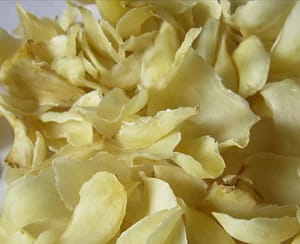There are 24 solar terms (节气) in a year and in the TCM (Traditional Chinese Medicine) perspective, it not only brings seasonal changes to our environment but also differences in how we should eat and take care of ourselves in different solar terms.
We are now in the Bai Lu (白露) solar term, which is the 15th solar term of the year. Bai Lu starts on the 08 and ends on the 23 Sept this year (2023).
It means that in this period, the temperature will start to turn cooler (the intensity depends on which part of the world you are living in). This also means that the differences in the day and night temperatures will start to widen.
During Bai Lu, more people will have their sinus and/or headaches triggered (due to sudden changes in temperature).
It is also easier for people to catch the flu if they don’t consciously keep warm, especially during nighttime.
The following are some simple diet and general well-being recommendations you can consider to make yourself more resistant to the flu and have a healthy body in this period.
Diet Recommendation
 There is a tradition in Fuzhou (China) that during Bai Lu solar term, it is a must to eat longan. It is said that eating longan in this solar term has a greater tonic effect than drinking herbal soup during this period.
There is a tradition in Fuzhou (China) that during Bai Lu solar term, it is a must to eat longan. It is said that eating longan in this solar term has a greater tonic effect than drinking herbal soup during this period.
Based on the records of the TCM herbs and foods, longan can boost blood and qi in the body, and hence, it is a good food to boost immunity. You can read more about the benefits of longan in this separate post (which includes a recipe for longan porridge).
Having said that, some people are not suitable to eat longan, for example, people who have a sore throat, fever, or currently having the flu.
If you find eating longan too heaty for your body constitution, you can add some lily (百合) and make it as a simple drink in the evening.
 Lily has the properties of nourishing the lungs, calming the mind, and helping in sleeping. In addition, it is cooling in nature, so it can neutralize the heaty effect when you eat longan.
Lily has the properties of nourishing the lungs, calming the mind, and helping in sleeping. In addition, it is cooling in nature, so it can neutralize the heaty effect when you eat longan.
You can purchase a fresh lily or even the dried lily (from TCM retail shop). If you are using dried lily, make sure you soak it in warm water for 60 minutes before you cook it (cook for 15 to 20 minutes is enough).
General Well-Being Recommendation
As the temperature gap between day and night widens, we need to take care and keep ourselves warm, especially at night.
During sleep, make sure to cover your chest and stomach area. Having the stomach exposed while sleeping may result in diarrhea/sticky stools for some people with weak spleen.
Be sure not to keep yourself overly warm during this period. As there is a saying, 春捂秋冻. Following this principle, you need to ‘train’ your body to be resistant to the upcoming cooler weather as well. Thus, wearing just enough not to feel too cool is the recommended approach.
Exercising is also good for improving your resistance to cooler weather ahead. In the past few days (In Singapore), the sky has been cloudy in the morning and it makes a good environment for morning jog or brisk walking. Do consider this!
I hope you find this post useful!
Feel free to post your questions if you have any.
I will be sharing more tips when the next solar term (Qiu Fen, 秋分) approaches.
